The Boot Box
May 2004
Reviews by Ted “The Boot” Boothroyd
 Jackie
Jackie
Brown: I Still Love You, Jackie Brown Music/Ejaness Reggae Comprehensive,
2003
Rating: A-
Same name; could it really be the
same guy? I am more than hopeful but not quite positive. I look at the
cover photos. Hmm, leather jeans and jacket, heavy jewelry, not exactly
my mental image of Jackie Brown. But yeah, must be him. An older him.
Its been so long. Over to my CD player. Track one: Look Pon You. A
riff thats familiar, taken from another song. The vocal starts. Familiar
voice, boyish voice, light and easy style; yes. Yes! Its him. I sit back,
relax, await whatever is ahead.
Whats ahead both reassures me
of Jackie Browns great talent and mildly disappoints that Jackie Browns
reggae has progressed. Apparently I didnt want him to progress, to keep
up with the times. My memories go back to his deep roots classics like
Wiser Dread, Sheep and Goat and Bearded Babylon. But these new tempos
are rushed, using various dancehall rhythms, and these arrangements are
modern. And yet, and yet. There is an old-fashionedness about this album,
and it makes me feel very, very comfortable. Is it that the songs are
short, there are 12 of them, and the whole thing clocks in at 43:19? Is
it Browns silky, reassuring tenor? The innocent lyrics combined with
appealing tunefulness? The numerous (sometimes extensive) musical allusions
to earlier songs, his own and others? Certainly its helped by his several
covers of decades-old country and western songshow can you sing, sweetly
and sincerely, Send me the pillow that you dream on/So darling I can
dream on it too, without appearing hopelessly old-fashioned, fast chugging
reggae beat or not?
I have a bunch of favorites, such
as Behold Jah Live with its intense, busy arrangement contrasting with
its Sunday School melody (think Cornell Campbells I Shall Not Remove).
But the whole album, despite its sometimes aggressive rhythms, is thoroughly
entertaining, comforting, even low-key, thanks to Browns beautiful voice
and relaxed vocal technique. Quaint would be a strange word to use, so
I wont. Charming would be better. Charming dancehall, thats what we
have here.
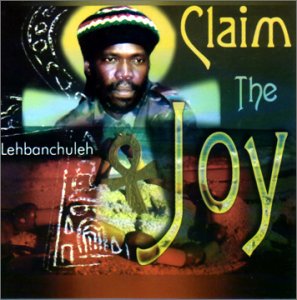 Lehbanchuleh:
Lehbanchuleh:
Claim the Joy, Banchu Musik (Stone Tiger Entertainment Group),
2003
http://www.stonetigerentertainmentgroup.com
Rating: A-
The name Lehbanchuleh is fairly
new to reggae, but in his previous incarnation as Norberth Clarke, this
guy has actually been active for quite a while. That fact goes a long
way toward explaining how this inaugural album can radiate the veracity
and confidence it does. How many of us could persuade Luciano, Mikey General,
Sugar Black, Anthony B. and Terry Ganzie to appear on our debut solo CD?
How many of us would implicitly challenge listeners to compare our own
singing and songwriting to Sam Cookes singing and songwriting by including
a cover of “Change Gonna Come, which Cooke wrote, sang and made
famous? And who among us would be brave or crazy enough to include an
a cappella song on any album, let alone our first? So, if you get the
feeling Im impressed, youre right.
High production values, accomplished
singing, interesting arrangements, memorable songs with constructive lyrics;
it goes from one crackerjack track to another. Especially impressive:
the hooky Hold On, Be Strong, the beautiful introduction to the Cooke
tune, the ear-grabbing interplays with guest deejays and singers, the
church-camp-style tune of Moving On, and very definitely, the unadorned
a cappella vocal treat. Listen for that one near the end; its called
BinghiManunfortunately its too subtle and beautiful for radio play,
so you may just have to get this album to hear it. According to the liner
notes, proceeds from sales will go to the Maxfield Park Childrens Home
in Kingston, Jamaicawhich I point out in case you need one final darn
good reason to buy it. Go ahead.
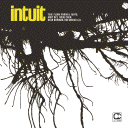 Intuit:
Intuit:
Intuit, Compost Records, 2004
Rating: B+
Attention all lovers of complex
Afro and Brazilian rhythms, laid-back jazz vocals and funky horn arrangements:
get Intuits Intuit and get into it, because this is your album.
Intuit is the new moniker for
a couple of musician/producer guys from southern Germany who have already
released big chunks of this music under their own names: Thomas Braun
and Till Maragnoli. So this is a sort-of best-of, plus kind of album,
which helps to account for the fact that it can go on and on for close
to 79 minutes of pretty strong to very strong material, with only one
repriseand even that one is a totally different arrangement. Considering
the wealth of musical ideas encased in all those tracks, this means theres
a lot to listen to here. And considering that the nine guest musicians
and vocalists are not merely along for the ride, but in truth make significant
contributions, this means that most of those many minutes are fresh and
interesting.
The primary strengths are in the
musicianship (includingvery much includingthe percussion) and in the
production, and thats obvious from the very start. With its lively and
emphatic bossa nova rhythms, the first song is a perfect introduction
to the album, and the perfect vehicle for Brazilian vocalists Airto Moreira
and Flora Purim. Just to keep it from becoming predictable, a funky horn-driven
r&b work-out emerges effortlessly part way along and then melds back
into the mix. The second track has a strong African feel, with Andy Bey
delivering a tight-throated but fluid and appealing jazz vocal. Next comes
A Hard Nights Day, which has nothing to do with A Hard Days Night,
not that I can detect; the singing this time falls into the easy-listening,
generic jazz mode that I dont particularly like, but hey, the arrangements
are fine and the vocal does eventually take a soulful turn.
Thats a taste of what to expect:
highly crafted arrangements, complex percussion and lots of attention
to the structure of the songs, including changes in tempo and mood. As
far as the English lyrics go, well, lets just say the sound is more important
than the sense, with well-meaning but fluffy advice and musings of an
uninvolved, unfocused, mixed-metaphor, pseudo-intellectual kind. Try this:
Relax yourself and let your mind be free. Or this: A new day is dawning
and its dawning in the west. Or: He watched himself break free, and
in the same song: Feel the sunrise burning in your heart.
But aside from an abstracted life
and existence as the common lyrical theme, theres not much to complain
about. Rhythms rule, inventiveness pervades, funkiness prevails. I do
believe I hear echoes of Sly and the Family Stone here and there, and
that in itself is a great sign.
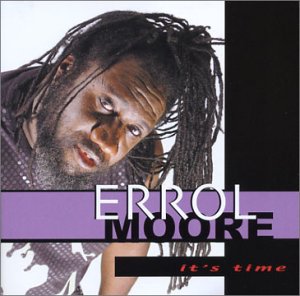 Errol
Errol
Moore: Its Time, Bad Newz Entertainment, 2003
Rating: B+
Its Time, and whats it
time for? The song of that name has one answer (see below), but the press
kit has a different one, suggesting its time for Errol Moore to take
centre stage, meaning he should come out of the shadows and step into
the revealing light he deserves. From what I hear on this CD, I wholeheartedly
agree. Too bad the photographer of the bizarrely-lit cover photo wasnt
brought on side, though. (It is marketing, after all, and Moore has already
been bitten once by a marketing issue.)
In those backstage shadows, Moore
has been doing reggae for a long timeproducing, song writing, audio engineering,
guitaring, band membering and even recording. So he knows what hes doing,
and it shows. Most of the tunes are strong (meaning memorable and distinctive);
the production is thoroughly professional, and the performances are up
to both of those high standards. Balance is a key thing too: rootsy singing,
lovers rock, dancehall rhythms, bopping beats, funky r&b horns and
lively female-duo raps all play their role in the mix. Moores exceptional
guitar skills are well-used but never gratuitous, and the sparkling background
vocals by Erica Newell are remarkably supportive, always fresh. The overall
result is not only listenable and danceable, but as confident and life-affirming
as one expects of a veteran reggae artist.
The lyrics are included, typos
and all, and they split about 60-40 between interesting and perceptive
(the 60), and bland and generic (the 40). As an example of the good stuff,
take first the urgent Signs of the Times in which you wonder whether
songwriter Errol Moore and filmmaker Michael Moore are related: If we
nuh deal with humanity/Then we will surely lose we liberty/Signs of the
times, so crazy crazy/Everyone afraid. Good example number two: Try
love, its the antidote to mental poison. Example three comes from the
title track, where to a swinging rhythm and friendly tune, the famous
passage from the Book of Ecclesiastes is given a neat twist: There is
a time to jump, time to prance/Time to sing, time to dance/Time for us
to move from behind/So Africanize your mind. Nice.
It all seems so comfortable and
easy-going, from Moores appealing songs to his self-assured delivery
(somehow relaxed even when intense) to the expert backing and sympathetic
production. Its good stuff, and this album well deserves its timeall
72 minutes of itin the light.
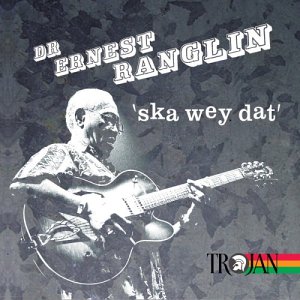 Dr.
Dr.
Ernest Ranglin: ska wey dat, (2 CDs) Trojan/Sanctuary, 2003
Rating: B+
In one package, four happy surprises.
First surprise for me: the Dr. designation. Nice going, Ernestan honorary
degree, no doubt, and well deserved after your long and illustrious career.
Second surprise: these are relatively recent recordings, not old tracks
unearthed from Trojan labels huge vaults. Pleasurable though that historical
stuff always is, its nice to see the label taking a present-tense mode
by licensing this worthy music and getting it out there internationally.
The first of the two CDs is actually
EB @ Noon, recorded after Ranglins acclaimed Memories of Barber
Mack and issued in 1999 with only limited distribution. Except for
the lead track, a big band powerhouse of a piece, this is relatively unadorned
jazz guitar at its finest, with all the skill, versatility and musicality
that genre implies. Yes, there is a modest ska or reggaeish groove on
most tracks, even including a smidgeon of nyahbingi drumming, but you
should think Django Reinhardt or Lenny Breau, not roots reggae or The
Skatalites.
Disk 2, entitled Ernest Ranglin
In O.D. (Live), presents a 1998 concert before a wildly involved California
audience. Its first few tracks continue the guitar workout, with Ranglin
joined by Cedric Im Brooks on tenor sax; but then, the third surprise:
Floyd Lloyds Ska Band appears halfway along and suddenly its party time.
The restrained beauty of Ranglins melodic, contemplative guitar gives
way to boisterous, danceable ska with Lloyd commanding the spotlight:
its a bit of a jolt.
And the fourth and final surprise:
the liner notes, by Stephen Nye, are actually coherent, interesting and
beneficial, not something to take for granted from Trojan Records. How
refreshing, and how appropriate, given the coherent, interesting and beneficial
music in this package.
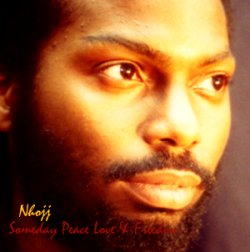 Nhojj:
Nhojj:
Someday Peace Love & Freedom, 2003
Rating: B
The mellowness of Sade, the ambition
and musical genius of Prince, the moral righteousness of Jesusno wonder
Nhojj has only one name.
Nhojj seems to have done everything
on this album except invent the jewel-box. He did the writing, arranging,
performing (vocals and instruments), producing, recording and mixing.
Thats an amazing feat, and it should therefore come as no surprise that
in his lyrics Nhojj is big on the first person. Here are some first lines:
I laid in my bed last night; I am begging at this corner; I am a
warrior preparing for war; My hearts been waiting; I once was lost
but now Im found, and I open my eyes and look around at the place I
am at (this one is spoken and unaccompanied; apparently its a poem.)
The second person does appear when he wants to give moral advice: What
would you do if you saw 2 children arguing?; Cut the strings untie the
things/That keep you down bound facing ground. And sometimes he shares
the stage: U are my sun U are my moon; Remember how we used to touch;
Some day well get together. Thats it; the only remaining track is
a very brief spoken bit of his philosophical advice. If he had shown any
humor at all, I would almost have expected the old line, But enough about
me; what do you think of my self-absorption? But he didnt
show any.
Fortunately, Nhojj does his introspection
in a reggae mode. His intimate, breathy, melodious singing generally ranges
from serene to tranquil, but he has created complex arrangements for what
goes on around the vocals. The songs are therefore highly individualized,
often with strong, inventive percussion. His harmonies (with himself,
of course) can be gorgeous. Yes, he makes some wonderful music, my favorite
being the Amazing Grace look-alike called Lost/Found, in which he
pounds out a solid rhythm between drum and guitar, and when his vocals
enter, theyre more direct and straightforward than usual, thanks to the
gospel influence. You can get lost in the funky strumming that continues
throughout the song, and in the prolonged scatting in the latter part,
but dont worry, youll find yourself again at the end. Very appealing.
Someday Peace Love & Freedom
. Sure, we sincerely hope so. I also sincerely hope that some day
Nhojj moves beyond himself and recognizes that there are other things
of importance in this world. Given his incredible talent, it would be
wonderful to see what could result.
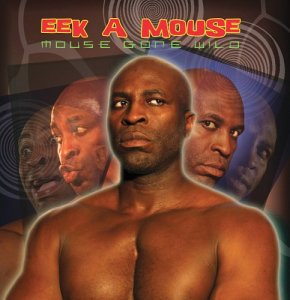 Eek-A-Mouse:
Eek-A-Mouse:
Mouse Gone Wild, RAS Records, 2004
Rating: D
This album is more YIKES than Eek.
I wonder if Mouse Gone Grotesque was the original title.
We all make mistakes; weve all
done things we regretted later. But we dont usually cram so many of them
together and willingly go public with the whole embarrassing package.
Its sad to witness Mouse doing that; its also sad to see reggae so debased.
In Lick Shot he gleefully brags
about being the wicked and strong original bad boy, complete with a
chuckle after the final gunshot sound effect. Then in Schizophrenic
he laughs that his medications not working. Soon he turns his attention
to refined sex: Take off your bra, take off your thong/You can feel my
bong, bong-diddy dong. Another song, more sensitive sex (with rich American
girls, please): Brunette, blonde or nappy head/Curly, straight, lets
go to bed. Next song, more discriminating sex (not just any female this
time, she has to be famous): Let me pick your cherry, Halle Halle Berry.
Then its the more comprehensive American Dream: From here its up
up and away/Stay out of my way/Make my day/Come, lets play/Im diggin
livin in the U-S-of-A. Im not clear how this great achievement of his
relates to the very next song, Hannibal the Cannibal, but Id like
to eat your wife, raw is one of the more subtle lines, so if its a clever
political statement then its a well disguised one.
Compare all that to the Eek-A-Mouse
of 1983s Struggle, where he sings (singjays, whatever) a stark, understated
tale of hardship: Under the golden moonlight she just sits there and
cries/Her only love had died leaving her with a child/Sometimes she just
a holler/Sometimes she just a bawl/Her budget it small, it really small/Yes,
she really feels it brother/God knows she feel it. The boy in that song
turned to crime in adulthood and got himself killed, leaving his mom worse
off than ever. The song was touching and powerful, the very antithesis
of Mouses one-dimensional approach and woeful abdication of social responsibility
now, twenty years on. Where the old Eek-A-Mouse tried to be part of the
solution, now hes happy to have become part of the problem.
In Pussy and the Mouse he sings
both the male and female (body) parts, orgasms and all, with the effect
that hes screwing himself. As far as Im concerned, thats exactly what
he has done. I wont be paying any more attention to Eek-A-Mouse.
I forgot to say something about
the music. Its dancehall. You can get your dancehall elsewhere.
——————
Although the closest Ted Boothroyd has come to a personal
association with the Caribbean was to have a Trinidadian grandfather, which
Ted
didn’t really have a lot to do with, he happily took in Harry Belafonte’s
calypso
hits in the ’50s and became a huge reggae fan in 1969 when Desmond
Dekker’s “Israelites” hit big in Canada. Ted has reviewed books
on Caribbean music for The Beat, writes album reviews for other periodicals,
and co-hosts
a reggae and world music radio show in Fredericton, New Brunswick,
on Canada’s east coast.
——————
Although the closest Ted Boothroyd has come to a personal
association with the Caribbean was to have a Trinidadian grandfather, which
Ted
didn’t really have a lot to do with, he happily took in Harry Belafonte’s
calypso
hits in the ’50s and became a huge reggae fan in 1969 when Desmond
Dekker’s “Israelites” hit big in Canada. Ted has reviewed books
on Caribbean music for The Beat, writes album reviews for other periodicals,
and co-hosts
a reggae and world music radio show in Fredericton, New Brunswick,
on Canada’s east coast.
——————
Although the closest Ted Boothroyd has come to a personal
association with the Caribbean was to have a Trinidadian grandfather, which
Ted
didn’t really have a lot to do with, he happily took in Harry Belafonte’s
calypso
hits in the ’50s and became a huge reggae fan in 1969 when Desmond
Dekker’s “Israelites” hit big in Canada. Ted has reviewed books
on Caribbean music for The Beat, writes album reviews for other periodicals,
and co-hosts
a reggae and world music radio show in Fredericton, New Brunswick,
on Canada’s east coast.
——————
Although the closest Ted Boothroyd has come to a personal
association with the Caribbean was to have a Trinidadian grandfather, which
Ted
didn’t really have a lot to do with, he happily took in Harry Belafonte’s
calypso
hits in the ’50s and became a huge reggae fan in 1969 when Desmond
Dekker’s “Israelites” hit big in Canada. Ted has reviewed books
on Caribbean music for The Beat, writes album reviews for other periodicals,
and co-hosts
a reggae and world music radio show in Fredericton, New Brunswick,
on Canada’s east coast.







1 comment
Matthew Capleton says:
Aug 19, 2017
Nice site and great reviews…especially Dr Ernest Ranglin